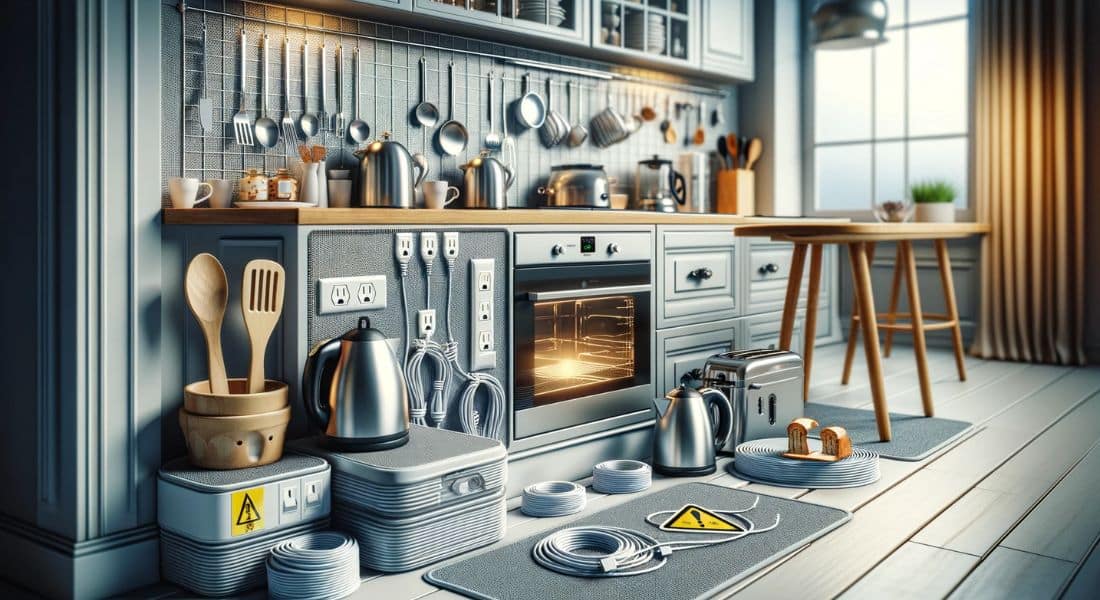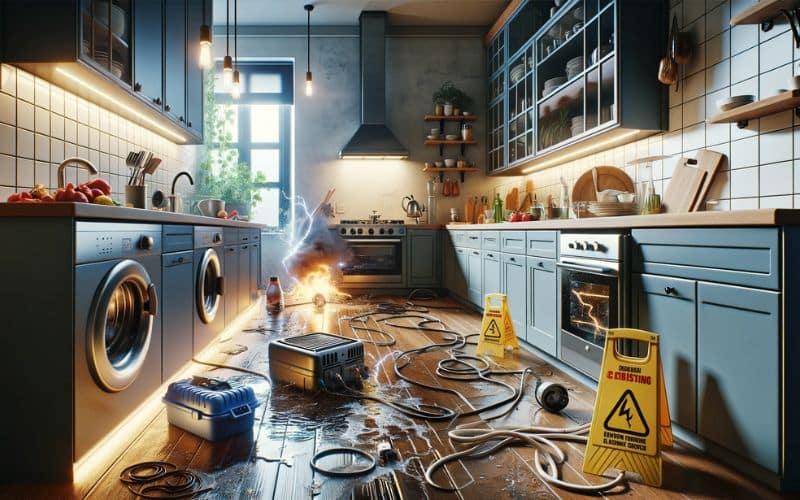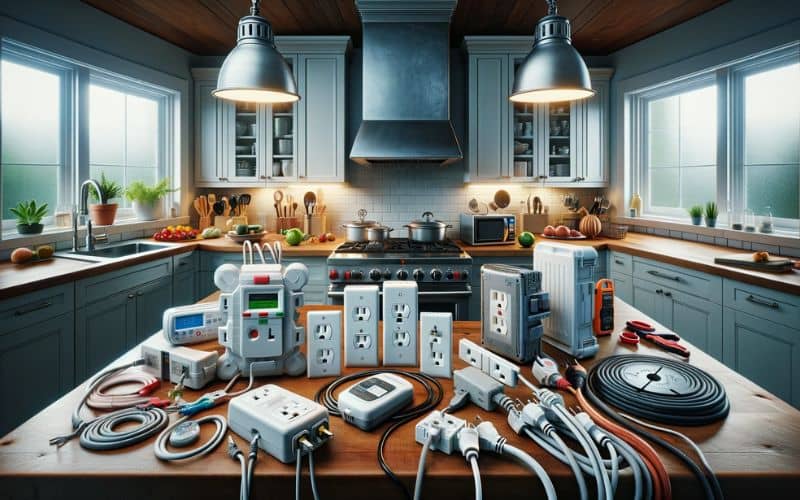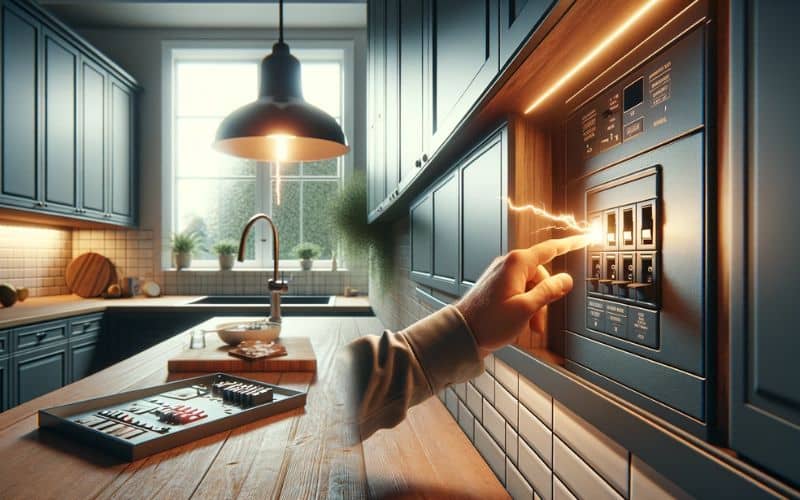The Ultimate Guide to Preventing Electrical Shock in the Kitchen 2024
Written by Total Power Energy Team
Published:

The Kitchen is an important part of any home, a space where delicious meals are prepared and memories are made.
However, According to recent statistics, over 100,000 people are injured in a kitchen due to an electrical accident.
This data reminds us of the importance of electrical safety in our homes. But worry not!
Our comprehensive guide focuses on preventing electrical shock in the Kitchen.
Provide practical safety tips to ensure your cooking space is both enjoyable and secure.
Understanding Electrical Shock
Electrical shock happens when current passes through the body. Shock severity can vary, but even a small jolt in the Kitchen can be dangerous, especially if it leads to falls or other injuries.
Understanding the basics of home electrical safety and the risks of shock in a kitchen environment is the first step in preventing electrical accidents.
Causes of Electric Shock in the Kitchen

Several factors contribute to Electrocution risks in the Kitchen:
- Wet Surfaces: Water conducts electricity, increasing the risk of shock. Spills near electrical appliances or outlets are particularly dangerous.
- Damaged Appliances: Frayed wires, loose connections, or malfunctioning appliances can lead to Electrical injury.
- Improper Use of Extension Cords: Overloading or using damaged Power cables can cause Electrical Fires
- Unattended Appliances: Leaving Devices on and alone, especially near flammable materials, can cause an electrical incident.
- Faulty Wiring: Old or improperly installed cable in the Kitchen can be a hidden danger for Current shock
- Unsecured Outlets: Loose or exposed outlets in your Kitchen can be hazardous, especially if they are within reach of water sources or where food is prepared.
11 Practical Safety Tips for Avoid Electrical hazard in the Kitchen

Install Ground Fault Circuit Interrupters (GFCIs)
GFCIs are critical in any kitchen electrical setup. These devices protect you by shutting off the power if a fault is detected.
Installing GFCIs in areas near water, like sinks, can significantly reduce electrical malfunction.
Regularly Inspect Electrical Cords
Inspect all cords in your Kitchen for signs of damage. A fray or tear in the cord can expose you to serious electrical hazards.
Regular inspection can help prevent accidents and ensure ongoing safety of your Kitchen.
Keep Electrical Appliances Away from Water Sources
Water increases the risk of electric shock. Always place Devices away from water sources and ensure they are dry before use. This simple step can prevent electrical injuries.
Use Dry Hands
Before handling any electrical Equipment, always dry your hands. Wet hands significantly increase the risk of electrical injury.
Unplug Appliances When Not in Use
To keep your Kitchen safe, make it a habit to unplug Devices after use. This not only prevents Electrocution but also conserves energy.
Avoid Overloading Outlets
Avoid overloading outlets to reduce the risk of electrical fire and electrical overloads.
Use only one appliance per outlet when possible, and avoid using multiple power strips or extension cords.
Properly Store Cords
Proper storage of cords helps Avoid electrical issues. Keep them organized and away from the sink and other water sources.
Educate Family Members
Inform your family about the importance of Safe Electrical Practices.
Share safety advice to help them understand how to prevent High-voltage shock.
Regular Appliance Maintenance
Ensure regular checks and maintenance of your kitchen appliances to avoid any electrical malfunctions.
Invest in High-Quality Appliances
Investing in high-quality Instruments can enhance kitchen electrical safety.
Good quality appliances often have better safety features and are less likely to malfunction.
Seek Professional Help for Repairs
For any electrical repairs, always consult a professional electrician. DIY repairs can increase the risk of electrical accidents in the Cookery area.
Safety Electrical Equipment to Avoid Electrical hazard

Here are some key pieces of electrical equipment that can significantly reduce the risk of accidents:
- Ground Fault Circuit Interrupters (gfci): These stop power during faults. Install near water for extra safety.
- Surge Protectors: Protect your Devices from sudden power surges.
- Circuit Breakers: Control electricity flow and prevent overloads.
- Proper Wiring and Wall Plates: Keep cable up to code and use wall plates to cover outlets.
- Extension Cords and Power Strips: Choose ones with safety features like overload protection.
- Child-Proofing Equipment: Use safety caps on outlets to protect kids.
- Safety Devices for Appliances: Look for Gadgets with automatic shut-off features.
How to Response an Emergency
In an electrical emergency in the Kitchen, immediately turn off the power source, like unplugging the appliance or switching off the breaker.
Then, carefully assess the victim without direct contact. If they’re unresponsive or have serious injuries, call emergency services immediately.
Conscious individuals seek medical advice even if injuries seem minor, as the effects of electricity can be delayed.
Bottom line
Following these electrical safety tips can significantly reduce the Electrical risks in your Kitchen.
By understanding and implementing measures such as GFCIs, regular inspections, and safe appliance usage, you can ensure that your Kitchen remains a safe and enjoyable environment.
Ready to ensure your Kitchen’s safe? Contact Total Power Energy Today for a comprehensive electrical inspection. Keep your home safe and efficient with our expert services. Call us Today!
Frequently Asked Questions
What are common signs of electrical problems in the Cooking area?
Look for signs like flickering lights, buzzing sounds from outlets, or malfunctioning Devices. These could indicate underlying electrical issues.
Can old wiring increase the risk of electrical danger in the Kitchen?
Yes, older home Cable networks can increase Electrical risks. If you have an old home, consider having an electrician inspect your electrical system.
Are there any special considerations for electric safety in a workplace kitchen?
Absolutely. Workplace electrical safety often involves more extensive use of appliances and more significant foot traffic, making regular safety checks and staff training crucial.
What should I do if I experience a minor electric shock?
Even a minor Electrocution can have underlying risks. Always dry your hands and disconnect the Instruments. If you feel any discomfort or concern, consult a medical professional.
Total Power energy content Team
Total Power Energy content team provide valuable tips and guidance on electrical information.
Our writers are experienced in the electrical field and produce high-quality content such as electrical safety, installation, repair, etc.
Our goal? To help you work safely and smartly. Our advice is easy to follow whether you’re at home or on the job. Stay safe and confident with our help!

